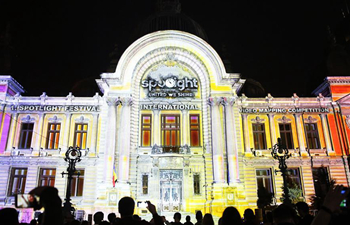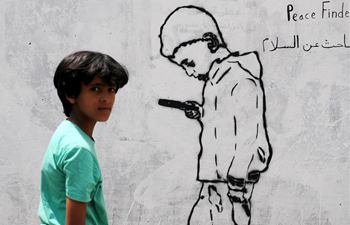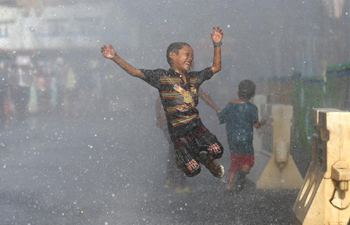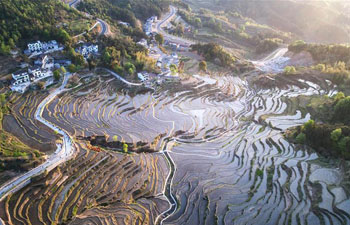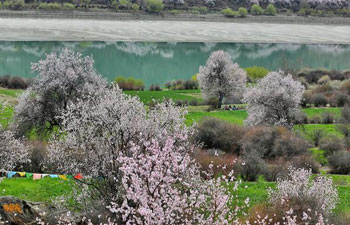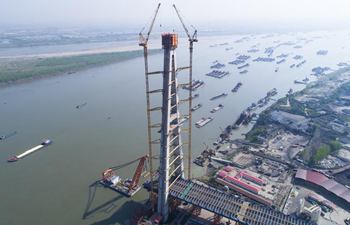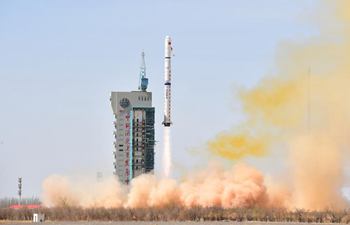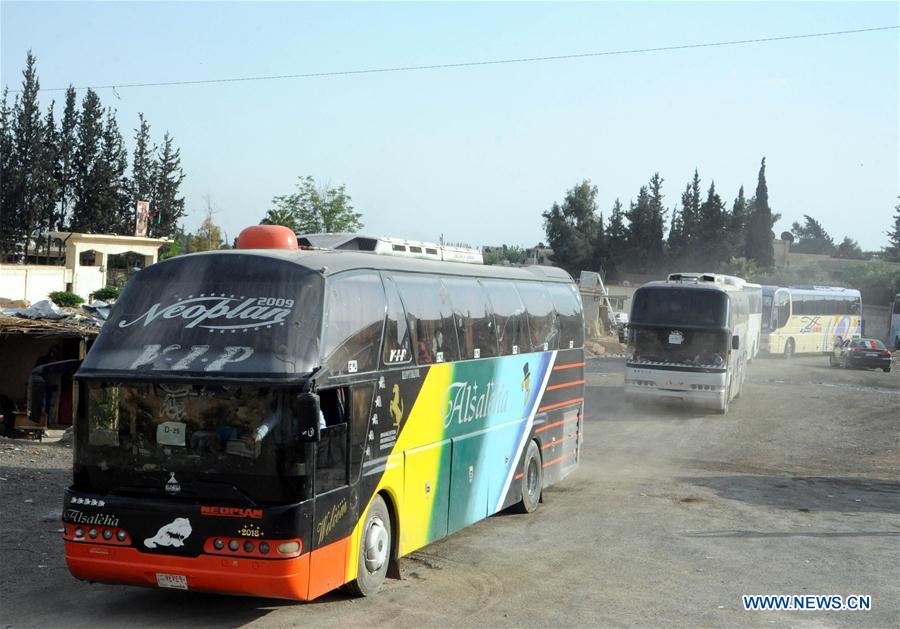
Buses transporting the rebels and their families from Douma district arrive at the Wafideen area, northeast of the capital Damascus, Syria, on April 13, 2018. Hundreds of Islam Army militants and their families were taken out of Douma to the nearby Wafideen area, an assembly point from which the rebels will evacuate to the rebel-held city of Jarablus as soon as the latest batch is ready to set off, according to the state news agency SANA. (Xinhua/Ammar Safarjalani)
DAMASCUS, April 13 (Xinhua) -- Around 93 buses with hundreds of Islam Army militants and their families onboard prepared on Friday to evacuate Damascus' eastern Douma district, amid reports of the arrival of the chemical weapons investigators on Saturday to look into allegations of toxic gas use in Douma.
Hundreds of Islam Army militants and their families were taken out of Douma to the nearby Wafideen area, an assembly point from which the rebels will evacuate to the rebel-held city of Jarablus as soon as the latest batch is ready to set off, according to the state news agency SANA.
Their evacuation is part of a deal concluded earlier this month between the militants and the Syrian side under a Russian mediation.
The report said the evacuation of the rebels from Douma is ongoing until the entire district is declared liberated from the rebels.
A day earlier, the Syrian Observatory for Human Rights monitor group said Russian military police started deploying in Douma district after the Islam Army rebels handed over their medium and heavy weapons and the Syrian flag was raised in that area.
In Moscow, Russian Defense Ministry also confirmed Thursday that its military police had started patrolling Douma to maintain law and order there.
The Russian military police are expected to be deployed in all of Douma in accordance with the deal reached on April 8, under which the Syrian official institutions will return to Douma, the last rebel bastion in Eastern Ghouta countryside of Damascus.
Douma has grabbed headlines worldwide recently as the Western governments and media accused the Syrian army of using chlorine gas there, sparking a U.S.-led threat of military strikes on Syria.
The Syrian government and Russia have denied the use of chemical weapons by the Syrian army, accusing the rebels and the West of fabricating it as an excuse to attack Syria.
The Syrian Foreign Ministry recently said it forwarded an invitation to the Organization for the Prohibition of Chemical Weapons (OPCW) to send a fact-finding mission to Douma to look into the allegations.
The OPCW later declared it was sending a team of investigators to Syria, with local reports saying the team will arrive in Damascus on Saturday to start its work.
On Thursday, the Syrian Foreign Ministry has reiterated the Syrian government's willingness to cooperate with an investigation team into the chemical attack allegations.
The ministry said the U.S. allegation of chemical weapons' use by the Syrian government forces in Douma is an attempt to mislead the public opinion to serve its "aggressive schemes."
Meanwhile, the ministry said that any delay in the arrival of the OPCW team would be blamed on the Western countries that want to hinder the mission.
This came as the White House on Friday renewed accusation that Syria was behind the suspected toxic gas assault on April 7 that allegedly killed dozens of people in Douma.
Both the White House and state department declared on Friday that the United States had "a high level of confidence" about the Syrian government's culpability for the suspected incident in Douma, marking a new shift from previous statements made by U.S. officials that Washington was still looking at the evidence.
Meanwhile, an emergency meeting at the UN Security Council took place on Friday under the demand of Russia to discuss the threats of potential U.S. strike on Syria.
Vassily Nebenzia, Russia's ambassador to the UN, said during the session that Russian specialists had found no traces of "toxic substance use" in Douma as claimed by the Western countries.
Russia had "clear evidence" that the incident was staged, as his country has made an accusation against Britain of being involved in organizing the attack in Douma.
Russia's Defense Ministry Spokesman Igor Konashenkov said that "we have evidence that proves Britain was directly involved in organizing this provocation" in Douma.
But the British Foreign Office slammed Moscow's accusation as "ludicrous."
All of the war of words and accusations come as U.S. President Donald Trump recently spoke about dealing a military strike on Syria but didn't say when amid Russian pledges to destroy the missiles that would target Syria and its launching sites as well.
Syrian President Bashar al-Assad said Thursday that any possible attack would only cause further instability of the region, which could threaten the international peace and security.
With every victory of the Syrian army, the Western countries raise the rhetoric and try to change the course of actions, Assad said during his meeting with visiting Ali Akbar Velayati, a senior advisor to Iran's Supreme Leader Ayatollah Ali Khamenei.
Both sides agreed that the threats of military action on Syria by Western countries are "mere lies made up by such countries and their tools of the terrorist groups inside Syria following the liberation of Eastern Ghouta" east of the capital Damascus.
Velayati reiterated Iran's firm stance in continuing its support for the Syrian government.
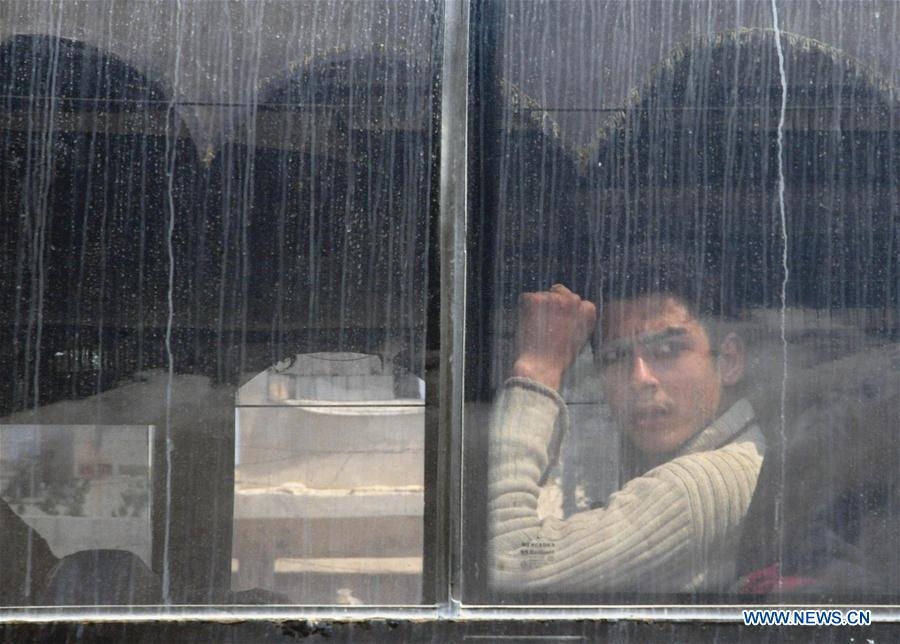
A boy is seen as he arrives at the Wafideen area, northeast of the capital Damascus, Syria, on April 13, 2018. Hundreds of Islam Army militants and their families were taken out of Douma to the nearby Wafideen area, an assembly point from which the rebels will evacuate to the rebel-held city of Jarablus as soon as the latest batch is ready to set off, according to the state news agency SANA. (Xinhua/Ammar Safarjalani)





